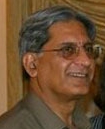Whether Benazir Bhutto was killed by a bullet to the head, shrapnel or a blow that resulted as her driver sped away from the scene, the challenge for the United States remains the same: how to pursue U.S. interests and the cause of international security in a country virtually everyone now labels “the most dangerous place on earth.”
Conventional wisdom goes that the terrorism threat is so great, with Pakistan just a hair’s breadth away from breakdown and nuclear chaos, that the U.S. must defer to the dictator in Islamabad to hold it all together. But the reality is that Bin Laden’s “al-Qaeda” is not the primary domestic or international threat in Pakistan, the nuclear arsenal is not that vulnerable, and relying on General Pervez Musharraf to deliver security and stability means continuing a failed policy. It’s time to change course. [complete article]
Elections face possible delay as Pakistani tensions grow
The most experienced opposition politician in Pakistan, Nawaz Sharif, upped the ante in the coming confrontation with the ruling party on Monday, calling for President Pervez Musharraf’s immediate resignation and the formation of a government of national consensus.
The attack, the most stinging public rebuke of the president from Mr. Sharif since his return from exile, was delivered amid strong indications that the government would postpone elections scheduled for Jan. 8 because of the chaos following the assassination of Benazir Bhutto, the other leading opposition leader.
While the government will not decide officially until Tuesday, officials with the Pakistani election commission said the voting would probably be delayed until the end of January or early February, despite Washington’s entreaties to hold it as scheduled. [complete article]
See also, Delayed election will be disaster for Musharraf (Zahid Hussain).
Since Musharraf has certainly read the handwriting on the wall and yet still intends to stay in power, there is not much foreign leaders can do, in effect, to encourage his departure. Many Pakistanis – and most Sindhis – believe Musharraf and the army had a role in the Bhutto killing, which took place in a garrison city. Musharraf cannot be trusted to conduct an impartial investigation of the murder of his top rival. He has sacked Pakistan’s independent-minded judges and imprisoned its lawyers.
The US and Britain should take the lead in demanding a UN investigation: the facts in this case are every bit as compelling as those that led the UN to appoint a special prosecutor to investigate the killing of former Lebanese prime minister Rafik Harriri. The Bhutto killing is tearing Pakistan apart. A UN investigation can help calm passions, but only the permanent departure of the army from power can provide a hope – and it is only a hope – of saving the country. [complete article]
New questions arise in killing of ex-premier
New details of Benazir Bhutto’s final moments, including indications that her doctors felt pressured to conform to government accounts of her death, fueled the arguments over her assassination on Sunday and added to the pressure on Pakistan’s leaders to accept an international inquiry.
Athar Minallah, a board member of the hospital where Ms. Bhutto was treated, released her medical report along with an open letter showing that her doctors wanted to distance themselves from the government theory that Ms. Bhutto had died by hitting her head on a lever of her car’s sunroof during the attack.
In his letter, Mr. Minallah, who is also a prominent lawyer, said the doctors believed that an autopsy was needed to provide the answers to how she actually died. Their request for one last Thursday was denied by the local police chief. [complete article]

 Interior Ministry spokesman Javed Iqbal Cheema, says, “This is not an ordinary criminal matter in which we require assistance of the international community. I think
Interior Ministry spokesman Javed Iqbal Cheema, says, “This is not an ordinary criminal matter in which we require assistance of the international community. I think  He is Washington’s ‘back up man’ in Pakistan. He can replace Benazir Bhutto in case she tumbles on the way due to any reason. Aitzaz Ahsan is the next horse Washington and the CIA are betting their future on in Pakistan.
He is Washington’s ‘back up man’ in Pakistan. He can replace Benazir Bhutto in case she tumbles on the way due to any reason. Aitzaz Ahsan is the next horse Washington and the CIA are betting their future on in Pakistan.